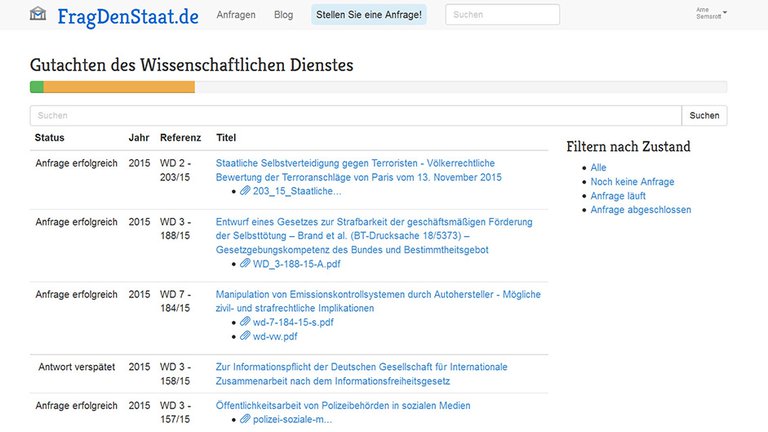Ask Parliament! - How to free scientific reports in large numbers
On February 18th 2016 German Parliament (“Bundestag”) announced the release of thousands of previously non-public reports conducted by the Research Section of Parliament in reaction to our campaign FragDenBundestag! (“Ask Parliament!”).

Background
The body known as Research Section (“Wissenschaftlicher Dienst”) is a panel of independent experts consisting of roughly 100 scientists and lawyers. Members of Parliament can turn to the Research Section for advice aiding them in making informed decisions, on topics they are not, or not as, familiar with. These can range from to the effectiveness of drug policies to TTIP or the likelyhood of an UFO landing on German territory (spoiler alert: it’s rather low).
The Research Section will conduct a survey and return an official report to the MP. Traditionally these reports have been held under tight wraps. They first famously came into the public eye when former Minister of Defence, Karl-Theodor zu Guttenberg, had abused the service by surrepticiously copying material, provided to him by the RS, to his PhD thesis (he later had to resign because of that).
Even though these reports technically fall under the FOI Act, they could previously not be requested that easily. Partly, because the specific nature of the documents was unknown, partly, because some MPs simply didn’t want the surveys to be public (one MP i.e. wondered about the “legal possibilities against neighbours sunbathing naked in their garden” - undisputedly a matter of national importance). Parliament argued that the reports were direct aids to the MP’s daily work and negotiations, and thus would not fall under the FOI Act. Luckily the Federal Administrative Court was of different opinion.
This January abgeordnetenwatch.de (“MP watch”), an NGO monitoring the goings-on in Parliament managed to FOIA a list of several thousand reports conducted by the RS between 2005 and 2015 after they had fought over it with the parliament for six months.
The campaign to free the reports could finally begin.
Our aim was to get government to release all reports proactively online. But the Parliament Office decided to ditch this convenient solution in favour of the much more tedious process of having every single report requested individually, to then send them out by mail - on paper, in an envelope.
Thus in mid-January, we decided to start a campaign calling upon civil society to request the reports, one by one, and see how the office would cope.
Implementation
Our platform FragDenStaat is an independent online service that allows for citizens to easily request official documents online under the FOI Act, and, if succesful, publishes them in its public database. This way FragDenStaat users have freed over 12.500 documents in the last years.
To make requesting the RS reports as convenient as possible, we created a searchable database with the report’s titles obtained by abgeordnetenwatch, and integrated it to our existing system of FOI requests. The RS report database was searchable by keywords of choice, auch as “drugs” or “refugees” and once an interesting report had been selected, the requester only had to attach his postal adress and commit. Each survey could only be requested once to ensure that no office work had to be done twice. A status bar at the top showed the percentage of reports already freed, and those currently requested.
Results
Within three weeks more than two thousand citizens had requested more than half of the reports. The office at the receiving end could not further cope with the flood of requests. Succombing to the public pressure facilitated through FragDenBundestag, Parliament decided to open their file cabinets:
All reports of the RS will now be actively published on www.bundestag.de/ausarbeitungen.
But not only that: The Parliament also changed its publication policy regarding all new reports. In the future, they will be released by the Parliament after a protective period of four weeks.
Unfortunately the platform of parliament does not provide machine readable formats but PDFs and only allows for search by key words in the title. Again FragDenStaat stepped in to show authorities how the future of information should look like. With the help of kleineAnfragen.de (our sister site collecting small inquiries by MPs) we launched sehrgutachten.de, a database providing all of the released reports in different machine-readable formats and categories, fully searchable.
The campaign FragDenBundestag, with very few ressources, managed to open up a trove of valuable information to the public, which, in the past was reserved to only a privileged few.
The code of the campaign tool is available here on Github.
This article is available in other languages.
- German: FragDenBundestag erfolgreich!